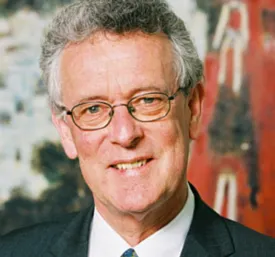Kevin Mooney: ‘New years of delay for Unified Patent Court unlikely’
June 11, 2021
It is very unlikely that the new complaints against the Unified Patent Court Agreement, which were filed last December with the German Federal Constitutional Court (FCC), will delay the Unitary Patent project for two or three more years. Kevin Mooney, partner of Simmons & Simmons and one of the driving forces behind the UPC and UP, had said this in an interview with Kluwer IP Law.

Mooney explained the current situation is different from 2017, when a complaint against the UPCA was filed with the FCC for the first time, by Düsseldorf patent lawyer Ingve Stjerna. It took the FCC three years to decide and partially uphold the complaint.
“The 2017 complaint included a request for preliminary measures to prevent the German Bundespräsident from signing the UPCA ratification bills into law. These preliminary measures however were never imposed because the president, at the request of the court, agreed not to sign the UPCA bills as long as there was no decision on the merits.”
One of the two new complaints that have been filed - one by Stjerna again and one by a private individual, a company and an association, probably linked to the Foundation for a Free Information Infrastructure (FFII) - includes a request for preliminary measures as well. This time however, the German president has said he will only delay his signature pending a decision on preliminary measures, according to Mooney. So it depends on the FCC’s decision about preliminary measures only when the president will sign the UPCA laws and the German ratification procedure can be completed.
Disgraceful
Mooney: “We had expected a decision very quickly, as soon as past January. Immediately after the complaints against the UPCA had been filed in December, the FCC asked the German Ministry of Justice for its views on the request for preliminary measures, and these views were filed to the FCC before the end of the year. When there was no decision in January, there were many rumours it could come out anytime, but we’re in June now and we’re still waiting. I have to say I think it is disgraceful that it takes so long for the FCC to make a decision on the grant or refusal of preliminary measures.”
If the FCC dismisses the request for preliminary measures and Germany proceeds with the ratification procedure, this means the Unitary Patent system can finally start functioning. Mooney admits this creates some uncertainty as long as the FCC has not decided on the merits of the complaints. “But this isn’t a big problem, firstly because after the preliminary decision it will take at least another 18 months before the Unified Patent Court can open its doors. Apart from that, we - me and others who are involved in the creation of the UPC and UP – are quite confident that the two complaints will be dismissed.”
Despite all the delays, Mooney is still regularly working on the optimization of the CMS of the future UPC, which is “a very complex system”.
For the Unitary Patent system to start, the first necessary step is that German and two other member states sign or express their support for the Protocol on Provisional Application. This protocol regulates the practical preparations for the UPC; if it enters into force this also means a budget will be available.
The plan is that after the phase of practical preparations, about 12 months according to Mooney, Germany will formally deposit its instrument of ratification with the European Council, thereby launching (three months later, art 89 UPCA) the Unitary Patent system.
“If the FCC were to dismiss the request for preliminary measures in July, for instance, this means the UPC could open its doors in October 2022, according to our timetable. But I have to admit that over the last years I have given many presentations about the Unified Patent Court, and I have had to change the dates in my slides many times”, Mooney said. “It has been a very frustrating process.”
As to the UK’s non-participation in the project, Mooney especially regrets that experienced UK judges will not be able to make judgements in the Unified Patent Court. “UK judges will take into account and respect decisions of the UPC and vice versa, but a chance for real European harmonization has been lost.”
You may also like














one of those...
Supertramp — Dreamer, was the first thing that came to my mind... And on which basis does he believe the complaints will be dismissed? Last time, the only decision that has been taken, was about not meeting the formal requirement during the parliamentary vote when transferring sovereign rights. But there were negative and dubious comments about the other merits in the decision already.
Andre Winterberg
The complainants should update their complaints: http://techrights.org/2020/12/03/epo-upc-fraudlinger/ The UPC will keep SMEs at bay with its high costs (20.000EUR if you want to defend yourself, and invalidate the patent of a troll or a competitor). That's the reason why Czech Republic is not ratitying any time soon, court fees for a simple case in Czech Republic is 80EUR. Mdme Frohlinger decided to recycle the old Impact Assessment of 2009 to hide the controversial "self-financed" aspect of the UPC (which the UPLS of 2009 was not), which explains why the UPC court fees are so high for SMEs. Art 36.3 of the UPCA with a court that seeks to be "self-financed" is destroying the integrity of the justice system, as judges will apply "patent maximalism" to be able to have a salary. There is a reason why courts in the different member states are not "self-financed". Courts are not companies with financial targets.
A. Rebentisch
The phrase "European harmonisation" refers to a specific process that would be achieved by a European substantive patent law directive with an aim to harmonise the patent law of member states. The elephant in the room is why this has not been tried. Why we still have 27 unharmonised patent laws. We harmonised patent law for biological matters in the EU, that is all. Neither new specialised Courts nor the EPO board of appeal or administrative practice nor WTO and trade treaties are a process for "European harmonisation" of patent law. If any, the Unified Court is just "enhanced cooperation" of EU member states. With the UK gone, it seems unwise not to try a genuine EU patent court as envisage in the EU treaties instead of the Unitary Court. Such a Court would not require diplomatic conferences, treaties and ratifications but the simple use of the ordinary legislative process of the EU. In other words, a true EU patent court would be easily achievable provided the European Commission presents a legal proposal.
No reason to be optimistic
I would agree with 'one of those' that there is no reason to be optimistic, like there was none when the first complaint was filed. This said, I would add to Mr Mooney's comments that the FCC should not be allowed to leave cases pending forever (the first case on the EPO is more than 10 years old), and should not be allowed to decide partially when they should know that the case will come back, with innuendos that the case suffers further deficiencies. Also, Mr Mooney says that it will take 15 further months, but that delay appears to be fine...